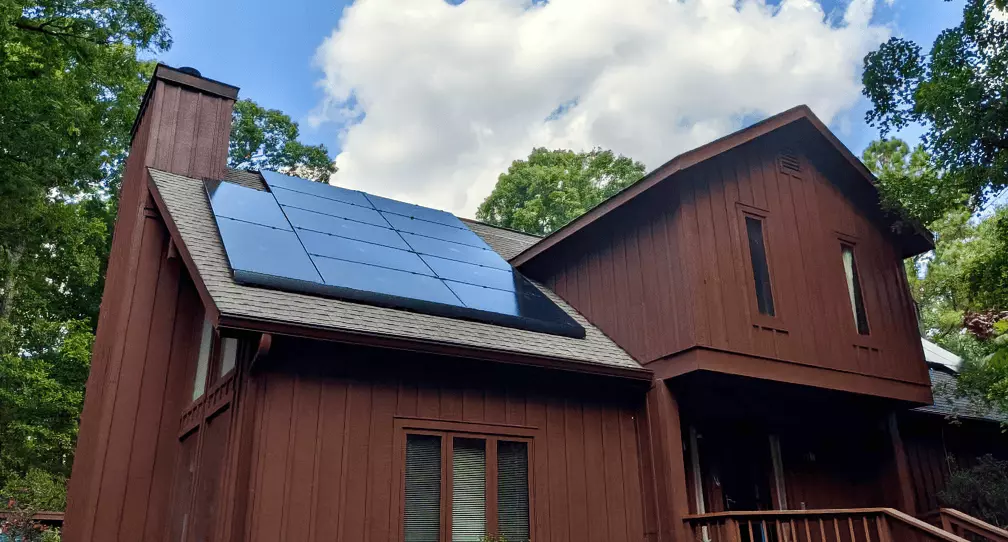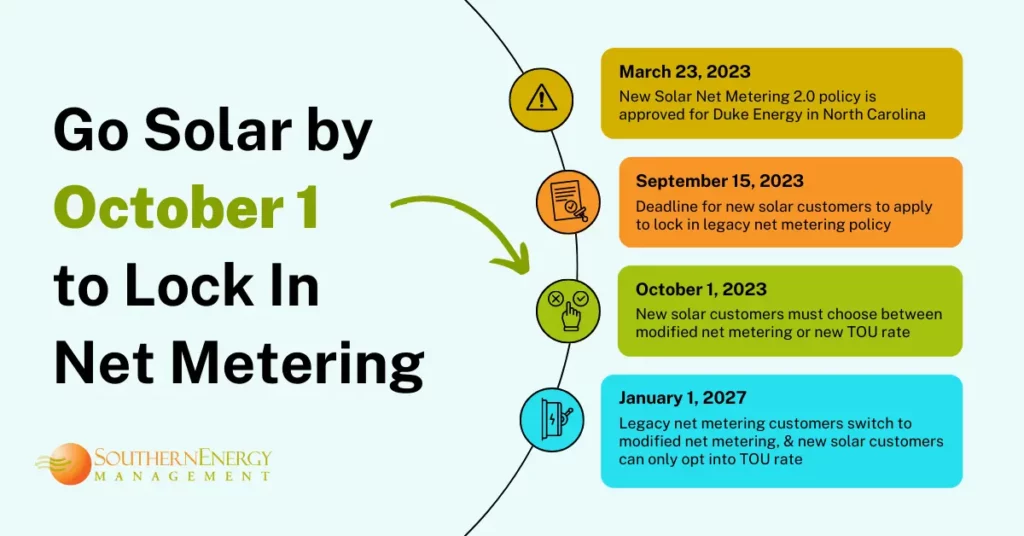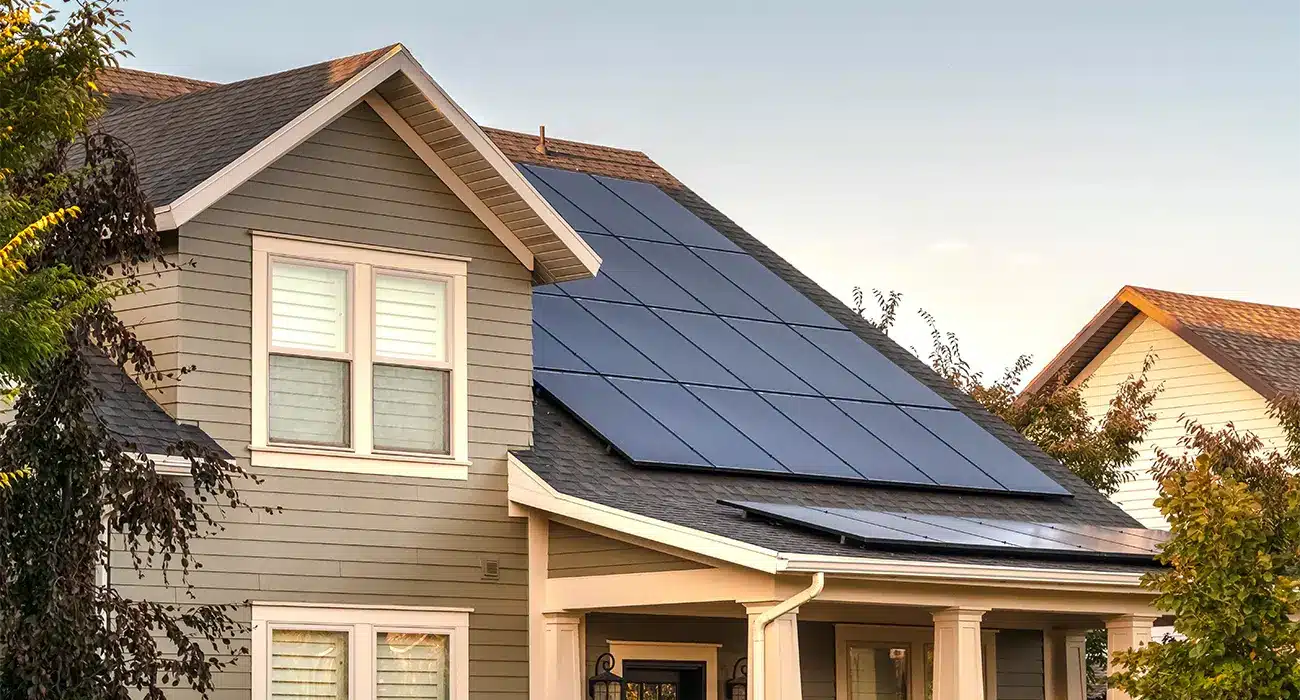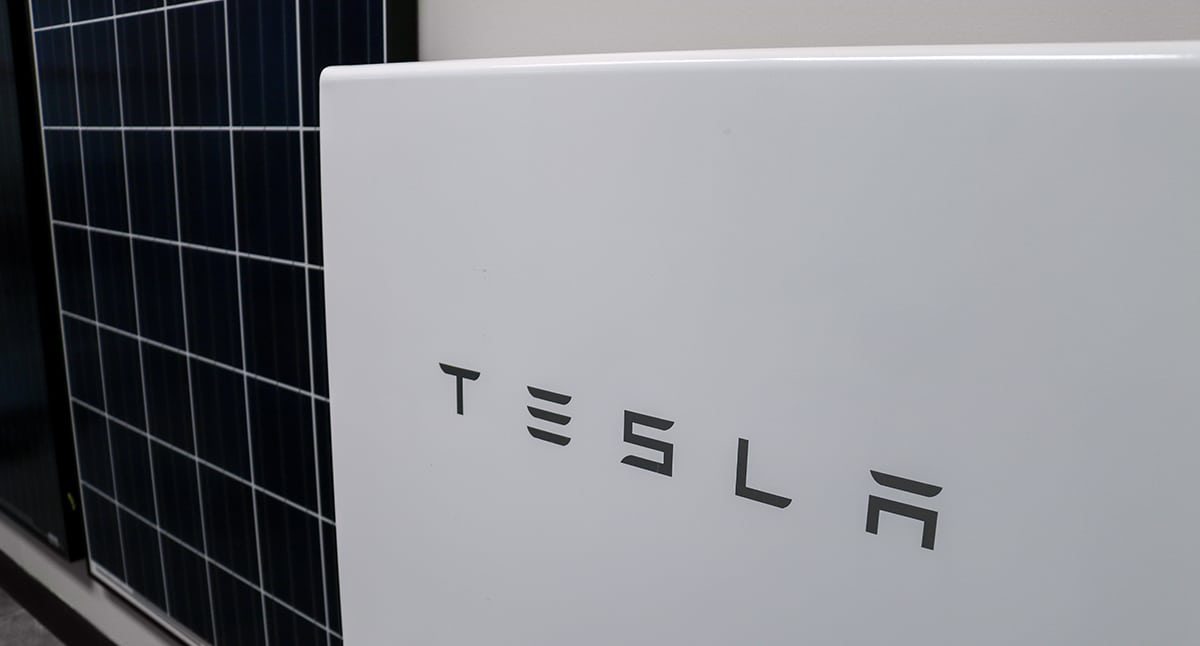Update as of 10/1/2023
Time flies and this blog is now officially outdated, as Duke Energy has implemented the restructuring of its solar net metering program.
Let’s take a moment to recap and bring you up to speed! Alongside other local solar companies in North Carolina this past year, we at Southern Energy have been actively engaged in conversations with Duke Energy to advocate for fair compensation for solar generation and solar consumer protection measures, among many other items. While the final structure may not hit all of our wish list items, we believe that Duke’s new solar program is still beneficial to homes and businesses looking to improve their energy independence and support clean energy.
Duke Energy’s new solar program offers you the flexibility to choose what suits you best on your solar journey. This means it is now as crucial as ever to work with a trusted installer who understands these updates and can collaborate with you to create a tailored energy solution for your home. With the 30% Federal Solar Tax Credit available, now is the time to go solar to secure your energy costs and protect yourself from the ever-rising utility rates.
If you’re curious about Duke’s new solar program options, reach out to one of our solar educators to see which pathway is right for you.
Topics in This Article
Is Net Metering Going Away in NC?
The short answer is no. But net metering will look different from its current form. Here are the highlights:
- Changes to Duke Energy’s NC solar net metering policy was approved on March 23, 2023
- Net metering changes for existing solar customers won’t take place until 2027
- New solar customers need to receive an approved interconnection request by October 1, 2023 to be grandfathered into the existing net metering structure (Note: this deadline was recently extended from July 1st)
- If you are considering going solar, the best time to go solar is right now so you will be grandfathered into the current net metering structure (and take advantage of the renewed 30% Federal Tax Credit for solar).
Topic 01
Current State of Solar Net Metering in NC
You may have heard by now that net metering is officially changing. After 20+ years as one of North Carolina’s oldest local solar installers, we’ve been through the many ups and downs the clean energy industry has to offer. Here’s the latest ride on the NC solar coaster — so buckle up and hold on tight! Before we dive into the new changes, let’s briefly look at the current state of net metering in North Carolina.
*Note: There are a handful of other smaller utilities that also offer net metering in NC. This article will focus on Duke Energy’s net metering changes.
Technical terms
What is net metering?
Net metering is a solar interconnection policy that controls how your solar system is connected to the utility’s grid AND how you are credited for the solar energy you produce.
With Duke’s current net metering policy, the utility stores your electricity credits at a 1:1 rate so you get the full retail value of your solar electricity. You can think of net metering like an energy bank that allows you to save your extra solar energy to use later during those rainy days.
How do net metering credits work right now?
Duke Energy installs a special “bi-directional” meter that captures when your solar system sends excess energy to the utility’s grid. This energy that you send to the grid is applied as a credit for you to use later when your solar system is not producing enough energy for your entire home–at night or on rainy days, for example. Sending this excess energy effectively turns the grid into a storage system for your solar array!
Why is solar net metering important?
Right now in North Carolina, net metering is the best interconnection policy for solar since it offers a true 1:1 credit for your solar energy. This allows homeowners to capture the most value out of their solar system. Other interconnection policies like buy-all-sell-all or buy-all-sell-excess and time of use rates (TOUs) compensate homeowners for their excess solar energy at a lower, wholesale rate than what they pay for electricity.
Technical terms
What are Time of Use (TOU) Rates?
TOU rates mean that your energy consumption and solar production are valued differently based on the hour of the day, day of the week, and month of the year.
The value of energy is outlined in a rate schedule, with the utility typically charging more for energy during peak demand hours (think mornings and evenings when everyone is at home). This is in contrast to a flat rate system where usage and solar production are valued the same every hour of the day, year-round.
Why is solar net metering changing in NC?
In November of 2021, Duke Energy filed a proposed change to North Carolina’s solar net metering policy with the NC Utilities Commission (NCUC). These changes are a byproduct of clean energy legislation passed in 2017 through House Bill 589. On March 23, 2023, a version of the proposed changes was approved by the NCUC which were set to go in effect on July 1. As of May 17, 2023, an extension was granted pushing the July 1st date to October 1, 2023.
The Evolution of Changes to Net Metering 2.0
If you know anything about Southern Energy Management, and especially our co-founders, Maria and Bob Kingery, you’ll know that we aim to stand for things, not against.
After initial net metering changes were proposed by Duke Energy, we were joined by 17 other solar companies, including our friends at Sundance Power Systems and Yes Solar Solutions, in asking Governor Cooper and NC Attorney General to help North Carolina stand for:
- Having a 3rd party perform the required study on the value and cost of net metering
- Fair compensation for solar generation
- Supporting local North Carolina clean energy jobs
- Advocating for homeowner pathways to energy independence
- Continuing solar growth to meet North Carolina’s climate goals
You can see our original letter to the governor here. Together with Stew Miller of YES Solar and Dave Hollister of Sundance Power Systems (along with the support of 17 other NC solar companies), our co-founder, Bob Kingery, was part of the working group involved in leading the intervention in the NCUC net-metering case. Through the collaboration of this group, we were able to negotiate a compromise that prevented a drastic reduction of the value of solar for NC solar customers while introducing new consumer protections. Let’s dive into what’s changing for solar and solar customers in NC with Net Metering 2.0.
Topic 02
What's Changing with Net Metering in North Carolina in 2023
Duke Energy is piloting a change to the net metering program that will add different fees for new customers who go solar after October 1, 2023. The new net metering program will also introduce a modified net metering structure and a secondary time-of-use rate plan with a new billing system. These changes are still developing, but what we do know is that going solar now will give you best opportunity to control the value of the energy your system produces in this new era of solar in North Carolina.
We’re continuing to work with policy partners, like NCSEA, and other solar companies to advocate for solar and ensure that solar will continue to be as valuable to North Carolinians as possible. As net metering changes go into effect, we will be tracking how these changes impact our customers and our local industry to advocate for adjustments to the policy. Our team is here to help you navigate what would be best for you, now and in the future – and to make that transition as smooth as possible.
You can read the full 42 page NC Utilities Commission approval filing if you want ALL the hairy deets, or keep reading here for the quick hits from our solar team.
Changes for Existing Solar Customers
Since you’ve already gone solar, take a deep breath – Nothing is changing for you right now. You’ll continue to be on your current solar net metering plan until 2027!
- Nothing is changing for you until 2027
- On January 1, 2027, you’ll be moved to a modified net metering rate, called a bridge rate, with a different set of fees applied to solar customers
We know you probably have a ton of questions and we’ll be here to answer them for you as soon as we can! Right now, we are working on modeling how the approved fees will impact current and future customers while getting more clarity on the approved changes. Please bear with us as we take this critical time to get as many homeowners into the current structure before October 1, 2023 so that they can have the same net metering opportunity as you.
As we better understand these changes and their impact, we will host a webinar to review these updates with you in the coming months. Until then, we’ll be collecting questions from our customers to answer during that webinar.
Changes for homes that go solar by Oct. 1, 2023
Solar Projects that have an interconnection application submitted to Duke Energy before October 1st, 2023 will be grandfathered into the legacy net metering program until 2027.
- After Jan 1, 2027, these solar customers will stay on a the modified net metering rate for 12 years, then switch to the new Time of Use (TOU) rate
- A new solar billing structure with different fees will also be introduced in 2027
Changes for homes that go solar after Oct. 1, 2023
Legacy net metering will not be available to customers who go solar after October 1st, 2023.
- A new set of fees will be applied to customers that go solar after Oct. 1, 2023
- New solar customers will need to choose between a modified net metering rate or the new TOU rate
- Determining the best rate option will depend on a lot of factors like whether you have batteries, your energy demand, whether you own or plan to own an electric vehicle, your lifestyle habits, and more
Bottom line — if you know anyone interested in going solar, now is the time! Going solar before October 1st gives new solar customers the most certain financial investment and more options going forward as the policy continues to evolve.
Ready to get started?
Topic 03
How do Net Metering changes impact the future of solar in North Carolina?
More Complex Calculations for the Value of Home Solar
Under the legacy net metering program, the value of solar energy is equal to the retail rate you pay for electricity. It’s easy to calculate because we can look at a customer’s historic utility bills, look at Duke Energy’s current rates, and voila: we know how much your solar energy production is worth. Under the new program, after October 1, the answer is not quite so simple for homes that switch to a time-of-use rate. Because of the way TOU rates work, solar’s value will be dependent on the:
- Time of day
- Day of the week
- Month of the year
- AND last but not least, the ratio of solar production vs energy consumption from hour to hour for each home.
All the variables add a lot of complexity to the solar design and modeling process. Under the legacy net metering system, we needed 24 energy data points to model solar effectively (12 months of the homeowner’s energy usage data and 12 months of projected solar production). Under the new system, that number increases to 17,520 data points, with hourly data required for both historic energy usage (8,760 hours) and projected solar production (another 8,760 hours).
These changes create more opportunities for miscalculating solar savings. This makes it more important than ever to consult with a local, established solar company who understands the ins-and-outs of these rates before you make your solar decision — and to make that decision now, before things get more complicated after October 1st.
New Consumer Protections Required
Because of the complexities net metering changes introduce into modeling solar’s value with TOU rates, the solar industry was adamant about including consumer protections for North Carolinians as part of negotiations with Duke Energy.
Under the approved changes, Duke Energy is required to create an online solar calculator to provide an accurate estimate of the financial impact of solar for a homeowner’s given address. This calculator has not yet been released, but is required to be created within 60 days of the March 23 approval. As we’re nearing the 60 day window, Duke Energy was recently granted an extension to develop the online bill savings calculator by July 1st, thereby extending the deadline for the new Net Metering policy to go into effect on October 1st.
We’ll be vetting this tool against our own calculations and will keep you posted as soon as we see it come through!
Calculate Your Solar Savings
See solar on your home! Our solar calculator uses your home address, the details you provide, and LIDAR satellite technology (with a dash of AI) to give you a ballpark estimate of how much you could save by going solar.
What Do the 2023 Net Metering Changes Mean for You?
What do these net metering changes mean for current solar system owners, people exploring solar, and everyone else?
🌞 If you already have solar:
Help your friends and family get started on their solar journey! Going solar before October 1, 2023 will give them access to the same benefits that you have as a legacy net metering customer.
✨ If you are considering solar:
Our advice is to go solar now so that you benefit from the current net metering structure and have more options going forward.
⛅ If you are not considering solar:
You should be! Regardless of the changes to Duke’s net metering policy, energy prices and our need for clean and independent energy is only going to go in one direction: up.
In Summary, Going Solar by october 1, 2023 will:
- Grandfather you into the legacy net metering system
- Allow you to avoid pilot program changes until 2027
- Provide the full range of options for how you are credited for solar in the future
- Give you the most certainty in your investment with more predictable savings
- Give you until 2027 to gather data points for us to model which option (modified net metering or TOU) will be best for you in the future
What's NExt?
Control Your Energy Future
If you are just starting on your solar journey, our best recommendation is to start your solar journey now, so you will be grandfathered into the current net metering system before the October 1st deadline.
Reach out to let us know if you’d like to get started and see if solar is a good fit for you!
Ready to Get Started?
Schedule a free assessment to learn more about solar power & battery storage for your home.
About Us
North Carolina’s solar power and building performance expert. Founded in 2001, we’ve worked for 20+ years to improve the way people make and use energy.















